false 0001829802 0001829802 2023-11-03 2023-11-03 0001829802 us-gaap:CommonStockMember 2023-11-03 2023-11-03 0001829802 us-gaap:SeriesAPreferredStockMember 2023-11-03 2023-11-03
UNITED STATES
SECURITIES AND EXCHANGE COMMISSION
Washington, D.C. 20549
FORM 8-K
CURRENT REPORT
Pursuant to Section 13 or 15(d)
of the Securities Exchange Act of 1934
Date of Report (Date of earliest event reported): November 3, 2023
Sensei Biotherapeutics, Inc.
(Exact Name of Registrant as Specified in its Charter)
|
|
|
|
|
| Delaware |
|
001-39980 |
|
83-1863385 |
| (State or Other Jurisdiction of Incorporation) |
|
(Commission File Number) |
|
(IRS Employer Identification No.) |
|
|
| 1405 Research Blvd, Suite 125 Rockville, MD |
|
20850 |
| (Address of Principal Executive Offices) |
|
(Zip Code) |
Registrant’s telephone number, including area code: (240) 243-8000
Check the appropriate box below if the Form 8-K filing is intended to simultaneously satisfy the filing obligation of the registrant under any of the following provisions:
| ☐ |
Written communications pursuant to Rule 425 under the Securities Act (17 CFR 230.425) |
| ☐ |
Soliciting material pursuant to Rule 14a-12 under the Exchange Act (17 CFR 240.14a-12) |
| ☐ |
Pre-commencement communications pursuant to Rule 14d-2(b) under the Exchange Act (17 CFR 240.14d-2(b)) |
| ☐ |
Pre-commencement communications pursuant to Rule 13e-4(c) under the Exchange Act (17 CFR 240.13e-4(c)) |
Securities registered pursuant to Section 12(b) of the Securities Exchange Act of 1934:
|
|
|
|
|
| Title of each class |
|
Trading symbol |
|
Name of each exchange on which registered |
| Common Stock |
|
SNSE |
|
The Nasdaq Stock Market LLC |
| Series A Preferred Stock Purchase Rights |
|
|
|
The Nasdaq Stock Market LLC |
Indicate by check mark whether the registrant is an emerging growth company as defined in Rule 405 of the Securities Act of 1933 (§230.405 of this chapter) or Rule 12b-2 of the Securities Exchange Act of 1934 (§240.12b-2 of this chapter).
Emerging growth company ☒
If an emerging growth company, indicate by check mark if the registrant has elected not to use the extended transition period for complying with any new or revised financial accounting standards provided pursuant to Section 13(a) of the Exchange Act. ☐
| Item 7.01 |
Regulation FD Disclosure. |
On November 3, 2023, Sensei Biotherapeutics, Inc. (the “Company”) issued a press release titled “Sensei Biotherapeutics Reports Favorable Clinical Data for SNS-101 at 2023 SITC Annual Meeting.” A copy of the press release is furnished as Exhibit 99.1 to this Current Report on Form 8-K.
On November 3, 2023, the Company updated its corporate presentation for use in meetings with investors, analysts and others. A copy of the presentation is furnished as Exhibit 99.2 to this Current Report on Form 8-K.
The information in Item 7.01 and the exhibits attached hereto are being furnished and shall not be deemed “filed” for the purposes of Section 18 of the Securities Exchange Act of 1934, as amended (the “Exchange Act”), or otherwise subject to the liabilities of that section, nor shall they be deemed incorporated by reference into any filing under the Exchange Act or the Securities Act of 1933, as amended, whether filed before or after the date hereof and regardless of any general incorporation language in such filing.
| Item 9.01 |
Financial Statements and Exhibits. |
(d) Exhibits
2
SIGNATURES
Pursuant to the requirements of the Securities Exchange Act of 1934, the registrant has duly caused this report to be signed on its behalf by the undersigned hereunto duly authorized.
|
|
|
|
|
|
|
|
|
|
|
|
|
Sensei Biotherapeutics, Inc. |
|
|
|
|
| Date: November 3, 2023 |
|
|
|
|
|
/s/ Christopher W. Gerry |
|
|
|
|
|
|
Christopher W. Gerry |
|
|
|
|
|
|
General Counsel and Secretary |
3
Exhibit 99.1
Sensei Biotherapeutics Reports Favorable Clinical Data for SNS-101 at 2023 SITC Annual Meeting
- Clinical dose escalation data for SNS-101 monotherapy show well tolerated safety profile,
potentially best-in-class pharmacokinetics, and encouraging cytokine release profile across multiple dose cohorts -
- First VISTA-blocking antibody administered at a dose anticipated to be therapeutically relevant without eliciting dose-limiting toxicity -
- Monotherapy data from Phase 1/2 study to be presented in a late-breaking poster presentation at the Society for Immunotherapy of
Cancer (SITC) Annual Meeting -
BOSTON, MA – November 03, 2023 – Sensei Biotherapeutics, Inc. (Nasdaq: SNSE), a clinical stage
immuno-oncology company focused on the discovery and development of next-generation therapeutics for cancer patients, today reported initial data from the monotherapy dose-escalation portion of its Phase 1/2 clinical trial for SNS-101, a conditionally active, human monoclonal antibody targeting the immune checkpoint VISTA (V-domain Ig suppressor of T cell activation). The data, to be presented in a
late-breaker poster presentation at the Society for Immunotherapy of Cancer (SITC) 38th Annual Meeting, suggest a potential
best-in-class safety and pharmacokinetic profile among VISTA blocking antibodies and the potential to overcome long-standing pharmacological challenges encountered by
first generation approaches to blocking VISTA.
“We are pleased to report favorable clinical data for
SNS-101, a pioneering VISTA-blocking antibody that provides validation of our conditionally active approach. The data support that this highly innovative antibody is well tolerated across dose levels tested to
date, shows linear, dose-dependent pharmacokinetics predicted preclinically to elicit immune-mediated anti-tumor activity, and a cytokine profile consistent with an absence of cytokine release syndrome,” said John Celebi, President and Chief
Executive Officer of Sensei Biotherapeutics. “Data from this clinical study to date provides important initial evidence that SNS-101 can provide clinically meaningful and mechanistic differentiation from
first generation anti-VISTA approaches, as indicated by SNS-101 dose levels that are at least 10 times higher than the first clinical study of a competitor VISTA antibody that was prematurely halted due to
cytokine release syndrome and poor pharmacokinetics. We believe this represents a foundational clinical achievement in the pursuit of a transformational VISTA-blocking antibody, and we look forward to building on this success with additional data
readouts, including efficacy analysis, expected next year.”
The multi-center Phase 1/2 clinical trial is a dose escalation study to evaluate the
safety, tolerability, pharmacokinetics, pharmacodynamics, and efficacy of SNS-101 as both a monotherapy and in combination with Regeneron’s PD-1 inhibitor Libtayo® (cemiplimab) in patients with advanced solid tumors.
Summary of reported data (as of the
October 3, 2023 cutoff date):
| |
• |
|
A total of 13 patients were enrolled in the study. |
| |
• |
|
In the monotherapy dose escalation arm, ten patients were enrolled across four dosing cohorts receiving SNS-101 treatment at 0.3, 1, 3, or 10 mg/kg. |
| |
• |
|
In the combination arm, three patients were enrolled at the first dose level of 3.0 mg/kg of SNS-101 plus 350 mg of Libtayo® (cemiplimab). |
| |
• |
|
Safety, cytokine expression and pharmacokinetic data were presented for seven patients from the first three
monotherapy cohorts, all of which have cleared the dose-limiting toxicity assessment period. |
| |
• |
|
A total of 11 adverse events (including one serious adverse event not considered related to SNS-101) was reported in five patients, with no dose-limiting toxicities observed. Only one adverse event (Grade 2 dermatitis acneiform) was considered related to SNS-101.
|
| |
• |
|
There were no instances of cytokine release syndrome and no significant changes in key inflammatory cytokines
over time, consistent with preclinical studies. |
| |
• |
|
Pharmacokinetic data demonstrate dose-proportional exposure consistent with lack of target mediated drug
disposition, no notable accumulation with repeat dosing, and linear elimination kinetics of SNS-101, in concordance with preclinical data. |
“Too many patients remain underserved by existing immunotherapies. SNS-101 highlights the potential of targeting
VISTA through an innovative concept, thoughtful approach and a well-executed study as Sensei has done,” said Shiraj Sen, M.D., Ph.D., a medical oncologist at NEXT Oncology and investigator on the Phase 1/2
SNS-101 clinical trial. “I’m encouraged by the patient experience so far in the SNS-101 trial, including a potentially best-in-class safety profile and an every-three-week dosing schedule that helps alleviate the logistical burden imposed on patients by agents requiring more frequent administration due to their unfavorable PK
profiles.”
Sensei expects to report initial safety and pharmacokinetic combination data in Q1 2024, with topline monotherapy data in Q2 2024, and
topline combination data in 2024.
Presentation at SITC:
Title: A phase 1/2 study of safety, tolerability and pharmacokinetics of SNS-101, a pH-sensitive anti-VISTA mAb, as monotherapy and in combination with cemiplimab in patients with advanced solid tumors
Presentation type: Poster (late breaking abstract)
Abstract Number: 1532
Date and time: Saturday,
November 4, 2023, at 9 a.m. PT – 8:30 p.m. PT
Location: Exhibit Halls A and B1 – San Diego Convention Center
Lead authors: Shiraj Sen, M.D., Ph.D. and F. Donelson Smith, Ph.D.
A copy of the presentation materials will be added to the “Events & Presentations” section of the Company’s Investor Relations
website at www.senseibio.com.
About Sensei Biotherapeutics:
Sensei Biotherapeutics (Nasdaq: SNSE) is a clinical stage immuno-oncology company focused on the discovery and development of next-generation therapeutics for
cancer patients. Through its TMAb™ (Tumor Microenvironment Activated biologics) platform, Sensei develops conditionally active therapeutics designed to disable immunosuppressive signals or
activate immunostimulatory signals selectively in the tumor microenvironment to unleash T cells against tumors. Sensei’s lead investigational candidate is SNS-101, a conditionally active antibody designed
to block the V-domain Ig suppressor of T cell activation (VISTA) checkpoint selectively within the low pH tumor microenvironment, where VISTA acts as a suppressor of T cells by binding the receptor PSGL-1. The company is also developing SNS-102, a conditional binding monoclonal antibody targeting V-Set and Immunoglobulin Domain
Containing 4 (VSIG-4), as well as SNS-103, also a conditionally active monoclonal antibody targeting ecto-nucleoside triphosphate
diphosphohydrolase-1 (ENTPDase1), also known as CD39. For more information, please visit www.senseibio.com, and follow the company on Twitter @SenseiBio and LinkedIn.
Cautionary Note Regarding Forward-Looking Statements
Any statements contained in this press release that do not describe historical facts may constitute forward-looking statements as that term is defined in the
Private Securities Litigation Reform Act of 1995. These statements may be identified by words and phrases such as “believe”, “designed to,” “expect”, “may”, “plan”, “potential”,
“will”, and similar expressions, and are based on Sensei’s current beliefs and expectations. These forward-looking statements include expectations regarding the development and potential therapeutic benefits of Sensei’s product
candidates, as well as the timing of Sensei’s Phase 1/2 clinical trial of SNS-101, including reporting of data therefrom. These statements involve risks and uncertainties that could cause actual results
to differ materially from those reflected in such statements. Risks and uncertainties that may cause actual results to differ materially include uncertainties inherent in the development of therapeutic product candidates, such as the risk that any
one or more of Sensei’s product candidates will not be successfully developed or commercialized; the risk of delay or cessation of any planned clinical trials of Sensei’s product candidates; the risk that prior results, such as signals of
safety, activity or durability of effect, observed from preclinical trials, will not be replicated or will not continue in ongoing or future studies or clinical trials involving Sensei’s product candidates; the risk that Sensei’s product
candidates or procedures in connection with the administration thereof will not have the safety or efficacy profile that we anticipate; risks associated with Sensei’s dependence on third-party suppliers and manufacturers, including sole source
suppliers, over which we may not always have full control; risks regarding the accuracy of our estimates of expenses, capital requirements and needs for additional financing; and other risks and uncertainties that are described in Sensei’s
Quarterly Report on Form 10-Q filed with the U.S. Securities and Exchange Commission (SEC) on or about August 3, 2023 and Sensei’s other Periodic Reports filed with the SEC. Any forward-looking
statements speak only as of the date of this press release and are based on information available to Sensei as of the date of this release, and Sensei assumes no obligation to, and does not intend to, update any forward-looking statements, whether
as a result of new information, future events or otherwise.
Investor Contact:
Michael Biega
Senior Director, Investor Relations
Sensei Biotherapeutics
mbiega@senseibio.com
Media Contact:
Chris Railey
Ten Bridge Communications
chris@tenbridgecommunications.com
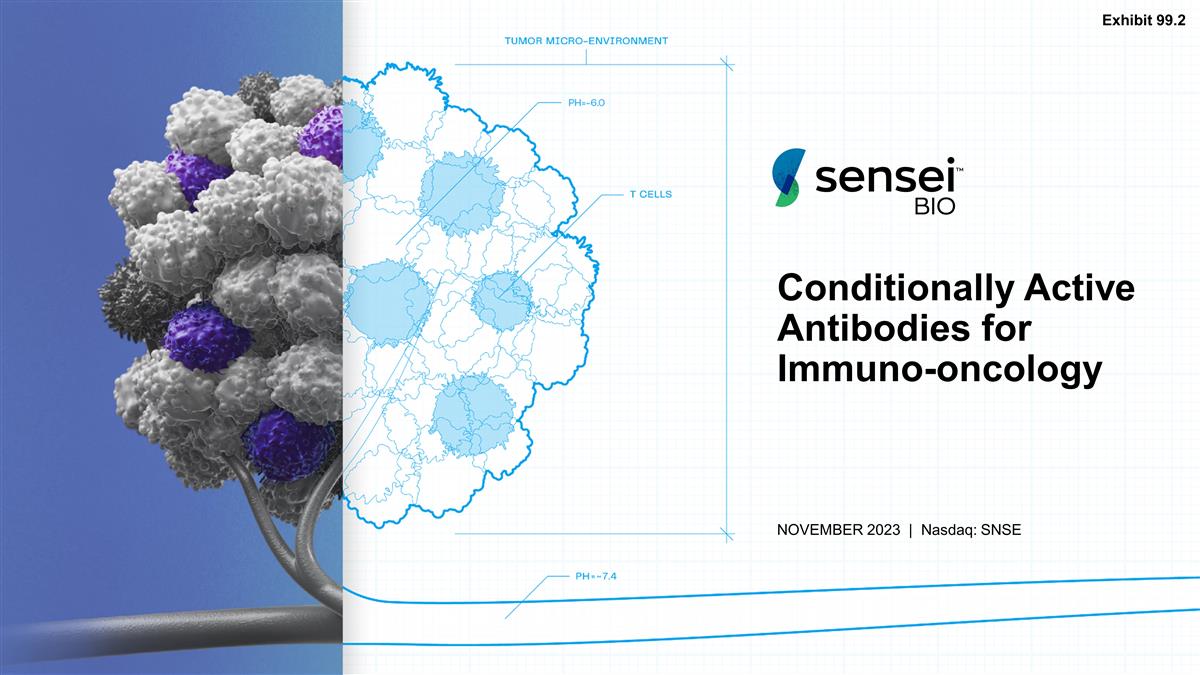
Conditionally Active Antibodies for
Immuno-oncology NOVEMBER 2023 | Nasdaq: SNSE Exhibit 99.2

Disclaimer This presentation has been
prepared by Sensei Biotherapeutics, Inc. (the “Company,” "we," "us") and is made for informational purposes only. The information set forth herein does not purport to be complete or to contain all of the information you may desire.
Statements contained herein are made as of the date of this presentation unless stated otherwise, and neither the delivery of this presentation at any time, nor any sale of securities, shall under any circumstances create an implication that the
information contained herein is correct as of any time after such date or that information will be updated or revised to reflect information that subsequently becomes available or changes occurring after the date hereof. This presentation
contains estimates and other statistical data made by independent parties and by us relating to market shares and other data about our industry. This presentation also contains "forward-looking" statements as that term is defined in the Private
Securities Litigation Reform Act of 1995 that are based on our management's beliefs and assumptions and on information currently available to management. These forward-looking statements include, without limitation, expectations regarding the
development and potential therapeutic benefits of our product candidates; the expected safety profile and pharmacokinetic profile of our product candidates, including SNS-101; the expected timing of clinical data from our Phase 1/2 clinical trial of
SNS-101; the availability of data from our preclinical studies; the timing of discovery and selection of product candidates; and our belief that our existing cash and cash equivalents will be sufficient to fund our operations at least into the
second half of 2025 and reach midway into Phase 2 clinical studies of SNS-101. When used in this presentation, the words and phrases "designed to," "may," "believes," "intends," "seeks," "anticipates," "plans," "estimates," "expects," "should,"
"assumes," "continues," "could," "will," "future" and the negative of these or similar terms and phrases are intended to identify forward-looking statements. Forward-looking statements involve known and unknown risks, uncertainties and other factors
that may cause our actual results, performance or achievements to be materially different from any future results, performance or achievements expressed or implied by the forward-looking statements. Risks and uncertainties that may cause actual
results to differ materially include uncertainties inherent in the development of therapeutic product candidates, such as preclinical discovery and development, conduct of clinical trials and related regulatory requirements, including the risk of
delay or cessation of any clinical trials of Sensei’s product candidates, our reliance on third parties over which we may not always have full control, risks regarding the accuracy of our estimates of expenses, capital requirements and needs
for additional financing, and other risk and uncertainties that are described in our Quarterly Report on Form 10-Q filed with the SEC on or about August 3, 2023 and our other Periodic Reports filed with the SEC. Forward-looking statements represent
our management's beliefs and assumptions only as of the date of this presentation and include all matters that are not historical facts. Our actual future results may be materially different from what we expect. Except as required by law, we assume
no obligation to update these forward-looking statements publicly, or to update the reasons actual results could differ materially from those anticipated in the forward-looking statements, even if new information becomes available in the
future. Certain information contained in this presentation relates to, or is based on, studies, publications, surveys and other data obtained from third-party sources and the Company's own internal estimates and research. While the
Company believes these third-party sources to be reliable as of the date of this presentation, it has not independently verified, and makes no representation as to the adequacy, fairness, accuracy or completeness of, any information obtained from
third-party sources. In addition, all of the market data included in this presentation involves a number of assumptions and limitations, and there can be no guarantee as to the accuracy or reliability of such assumptions. Finally, while we believe
our own internal research is reliable, such research has not been verified by any independent source.
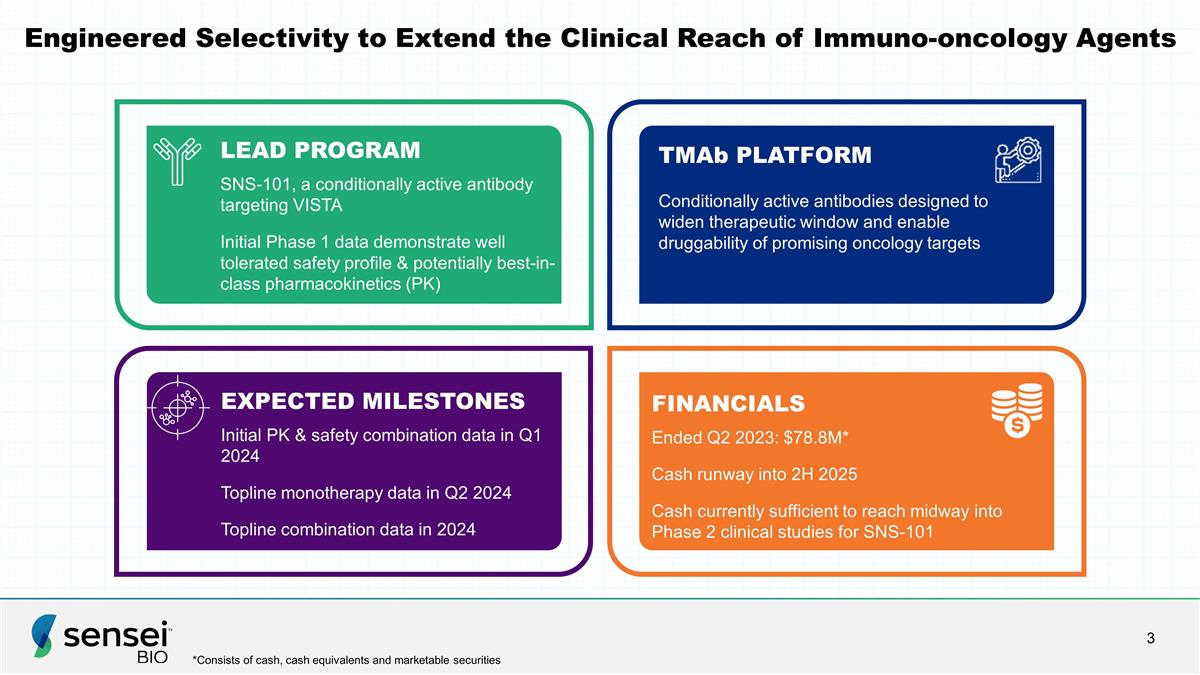
*Consists of cash, cash equivalents
and marketable securities LEAD PROGRAM SNS-101, a conditionally active antibody targeting VISTA Initial Phase 1 data demonstrate well tolerated safety profile & potentially best-in-class pharmacokinetics (PK) TMAb PLATFORM Conditionally active
antibodies designed to widen therapeutic window and enable druggability of promising oncology targets EXPECTED MILESTONES Initial PK & safety combination data in Q1 2024 Topline monotherapy data in Q2 2024 Topline combination data in 2024
FINANCIALS Ended Q2 2023: $78.8M* Cash runway into 2H 2025 Cash currently sufficient to reach midway into Phase 2 clinical studies for SNS-101 Engineered Selectivity to Extend the Clinical Reach of Immuno-oncology Agents
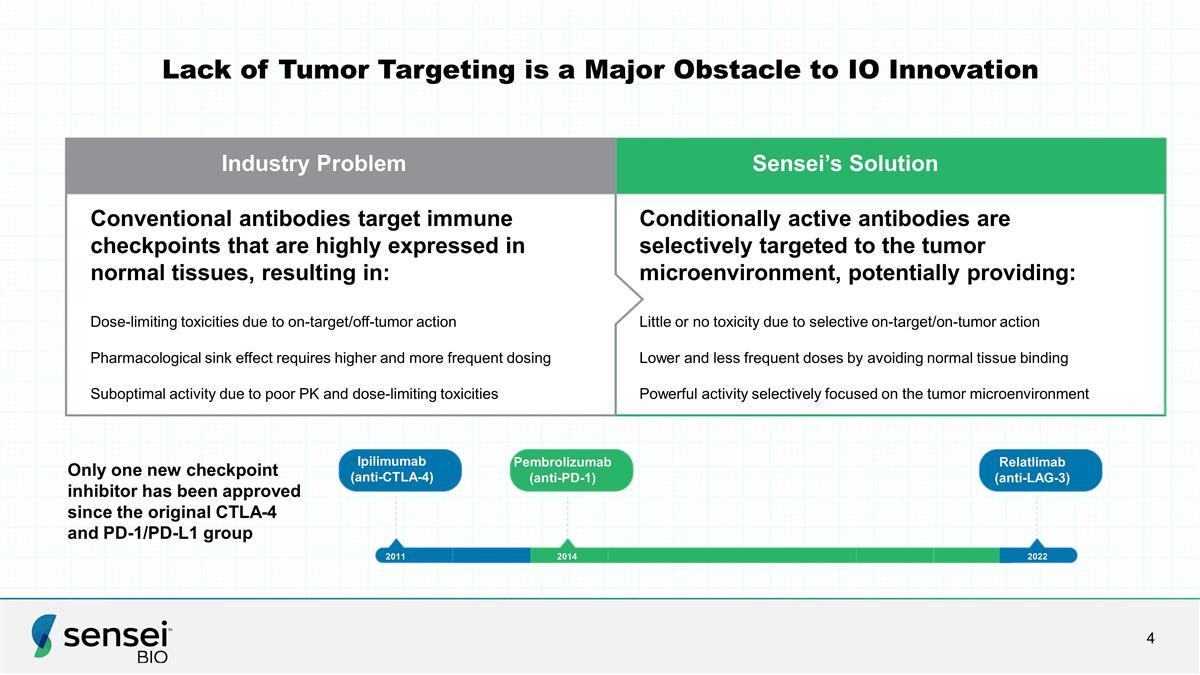
Lack of Tumor Targeting is a Major
Obstacle to IO Innovation Industry Problem Sensei’s Solution Conventional antibodies target immune checkpoints that are highly expressed in normal tissues, resulting in: Dose-limiting toxicities due to on-target/off-tumor action
Pharmacological sink effect requires higher and more frequent dosing Suboptimal activity due to poor PK and dose-limiting toxicities Conditionally active antibodies are selectively targeted to the tumor microenvironment, potentially providing:
Little or no toxicity due to selective on-target/on-tumor action Lower and less frequent doses by avoiding normal tissue binding Powerful activity selectively focused on the tumor microenvironment Only one new checkpoint inhibitor has been approved
since the original CTLA-4 and PD-1/PD-L1 group Ipilimumab (anti-CTLA-4) Pembrolizumab (anti-PD-1) Relatlimab (anti-LAG-3) 2011 2014 2022
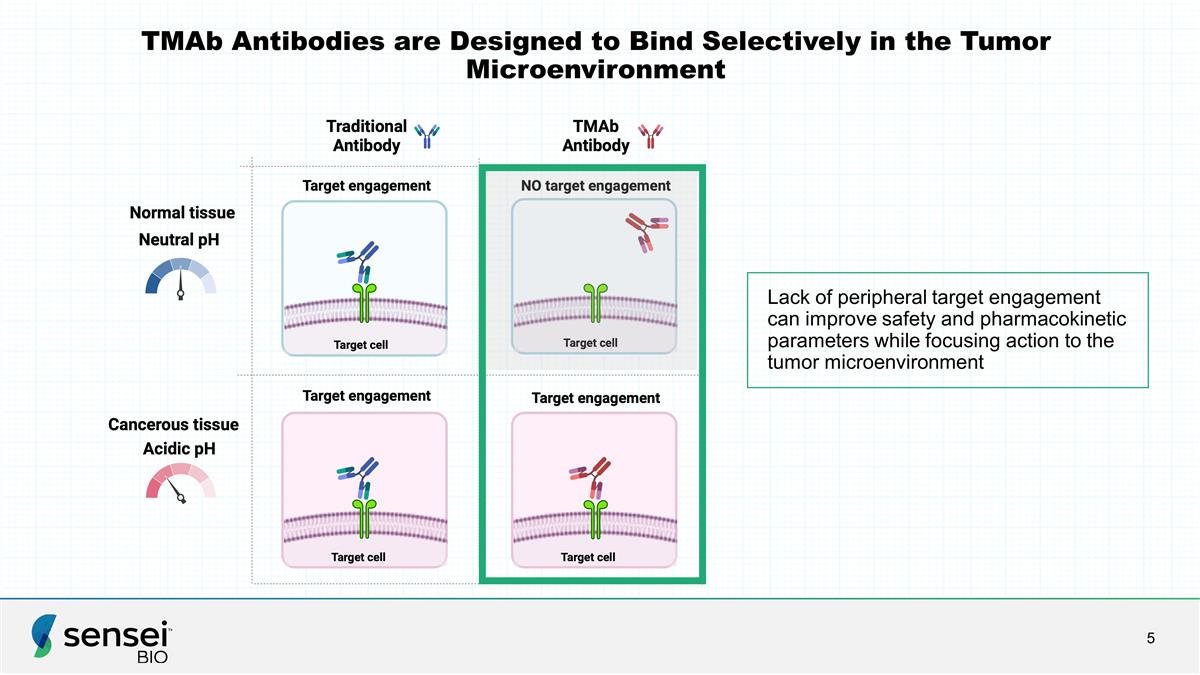
TMAb Antibodies are Designed to Bind
Selectively in the Tumor Microenvironment Lack of peripheral target engagement can improve safety and pharmacokinetic parameters while focusing action to the tumor microenvironment
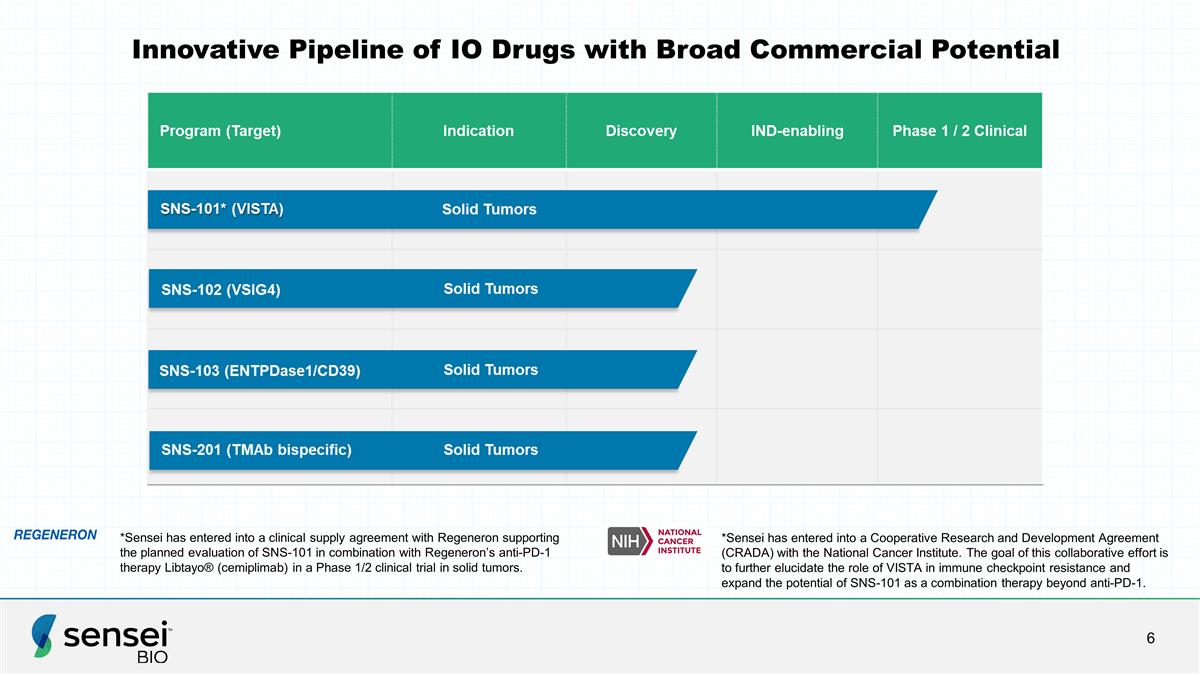
Innovative Pipeline of IO Drugs with
Broad Commercial Potential *Sensei has entered into a clinical supply agreement with Regeneron supporting the planned evaluation of SNS-101 in combination with Regeneron’s anti-PD-1 therapy Libtayo® (cemiplimab) in a Phase 1/2 clinical
trial in solid tumors. *Sensei has entered into a Cooperative Research and Development Agreement (CRADA) with the National Cancer Institute. The goal of this collaborative effort is to further elucidate the role of VISTA in immune checkpoint
resistance and expand the potential of SNS-101 as a combination therapy beyond anti-PD-1.

SNS-101
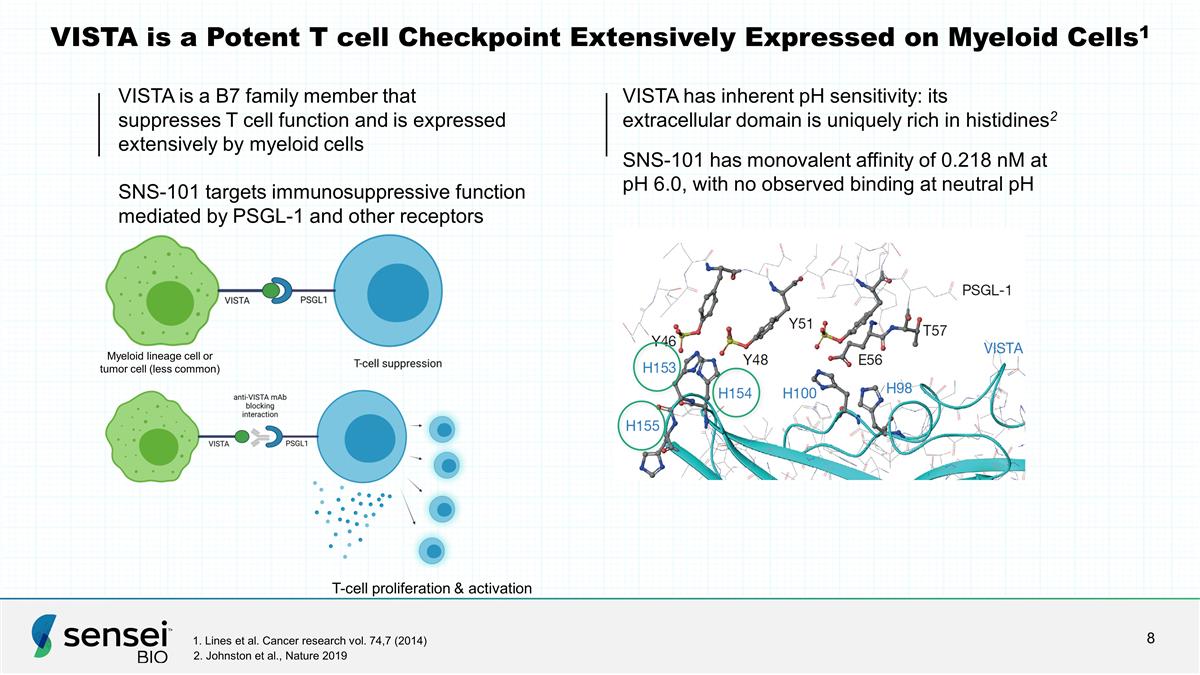
VISTA is a Potent T cell Checkpoint
Extensively Expressed on Myeloid Cells1 1. Lines et al. Cancer research vol. 74,7 (2014) VISTA is a B7 family member that suppresses T cell function and is expressed extensively by myeloid cells SNS-101 targets immunosuppressive
function mediated by PSGL-1 and other receptors T-cell proliferation & activation VISTA has inherent pH sensitivity: its extracellular domain is uniquely rich in histidines2 SNS-101 has monovalent affinity of 0.218 nM at pH 6.0, with no
observed binding at neutral pH 2. Johnston et al., Nature 2019 Myeloid lineage cell or tumor cell (less common)

Historical Challenges Targeting
VISTA-Positive Myeloid Cells Resulted in Early Clinical Trial Termination JNJ-61610588 Human Plasma Concentration JNJ-61610588 (CI-8993) was the first anti-VISTA antibody to be studied in clinical trials in 2016 (NCT02671955) 1 Transient Cytokine
Release Syndrome (CRS) observed in several patients at 0.15 mg/kg Transient Grade 3 CRS-associated encephalopathy observed at 0.3 mg/kg, after which Janssen halted the study Challenging PK profile Non-linear PK, short t1/2 Dose-limiting toxicity
Grade 3 CRS-associated encephalopathy 1 Curis, Inc., Corporate Presentation, Feb 2022

SNS-101 is a Differentiated,
pH-Sensitive Antibody Designed to Overcome the Unique Challenges of VISTA Potential Best-in-Class Safety and PK Profile Supported by Initial Clinical Data No observed CRS or dose-limiting toxicity and no evidence of target-mediated
drug disposition* Rapidly Enrolling Phase 1/2 Clinical Trial Multi-center U.S. study as single agent and in combination with PD-1 inhibitor Libtayo® First VISTA-blocking antibody administered at a dose anticipated to be
therapeutically relevant without eliciting dose-limiting toxicity Achieving "Firsts" for the VISTA Field Differentiated Design and Mechanism IgG1, Fc-active antibody designed to selectively block VISTA in the low-pH tumor
microenvironment Approaching Near-Term Clinical Milestones Anticipate initial combination PK/safety data in Q1 2024 with topline monotherapy data in Q2 2024 and topline combination data in 2024 *As of safety cut-off date of October 3,
2023
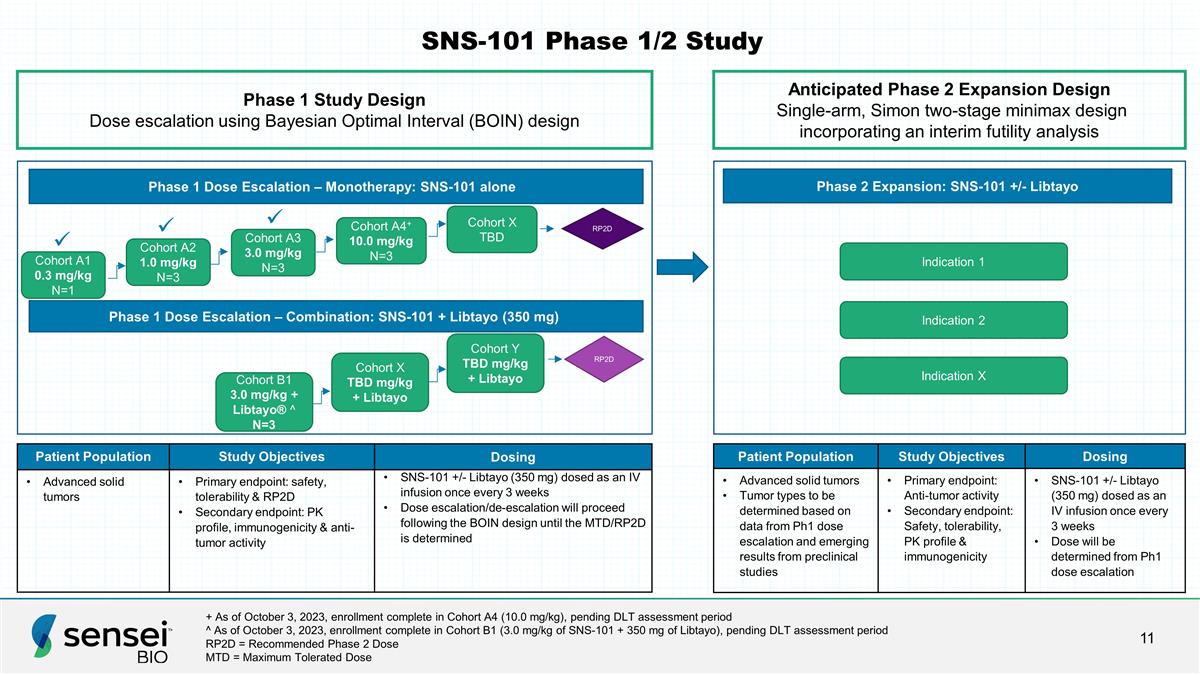
SNS-101 Phase 1/2 Study + As of
October 3, 2023, enrollment complete in Cohort A4 (10.0 mg/kg), pending DLT assessment period ^ As of October 3, 2023, enrollment complete in Cohort B1 (3.0 mg/kg of SNS-101 + 350 mg of Libtayo), pending DLT assessment period RP2D =
Recommended Phase 2 Dose MTD = Maximum Tolerated Dose Phase 1 Dose Escalation – Monotherapy: SNS-101 alone Phase 1 Dose Escalation – Combination: SNS-101 + Libtayo (350 mg) Cohort A1 0.3 mg/kg N=1 RP2D Cohort B1 3.0
mg/kg + Libtayo® ^ N=3 RP2D Phase 2 Expansion: SNS-101 +/- Libtayo Indication 1 Indication 2 Indication X Phase 1 Study Design Dose escalation using Bayesian Optimal Interval (BOIN) design Patient Population Study Objectives Dosing
Advanced solid tumors Primary endpoint: safety, tolerability & RP2D Secondary endpoint: PK profile, immunogenicity & anti-tumor activity SNS-101 +/- Libtayo (350 mg) dosed as an IV infusion once every 3 weeks Dose
escalation/de-escalation will proceed following the BOIN design until the MTD/RP2D is determined Anticipated Phase 2 Expansion Design Single-arm, Simon two-stage minimax design incorporating an interim futility analysis Patient Population
Study Objectives Dosing Advanced solid tumors Tumor types to be determined based on data from Ph1 dose escalation and emerging results from preclinical studies Primary endpoint: Anti-tumor activity Secondary endpoint: Safety,
tolerability, PK profile & immunogenicity SNS-101 +/- Libtayo (350 mg) dosed as an IV infusion once every 3 weeks Dose will be determined from Ph1 dose escalation Cohort A2 1.0 mg/kg N=3 Cohort A3 3.0 mg/kg N=3 Cohort A4+
10.0 mg/kg N=3 Cohort X TBD ü Cohort X TBD mg/kg + Libtayo Cohort Y TBD mg/kg + Libtayo ü ü

SNS-101 Displayed Favorable Safety
& Tolerability Profile DLT = Dose limiting toxicity CRS = Cytokine release syndrome TEAE – Treatment emergent adverse event SAE = Serious adverse event 0.3 mg/kg N=1 n (%) 1.0 mg/kg N=3 n (%) 3.0 mg/kg N=3 n (%) Total N=7 n (%) At least 1
TEAE 1 3 1 5 (71.4) At least 1 SAE 0 0 1* 1* (14.3) At least 1 TEAE leading to discontinuation 0 0 1* 1* (14.3) DLTs 0 0 0 0 CRS events 0 0 0 0 ≥Grade 3 TEAE 0 0 1* 1* (14.3) Related TEAE 0 1# 0 1# (14.3) *One patient experienced an SAE, Grade
5 bronchial obstruction, that resulted in death; Event was not considered related to SNS-101, but to disease progression. # One patient experienced a Grade 2 dermatitis acneiform considered to be related to SNS-101. Well Tolerated with No
Evidence of Cytokine Release Syndrome and No Dose-Limiting Toxicity Observed Data from monotherapy dose escalation arm as of safety cut-off date of October 3, 2023
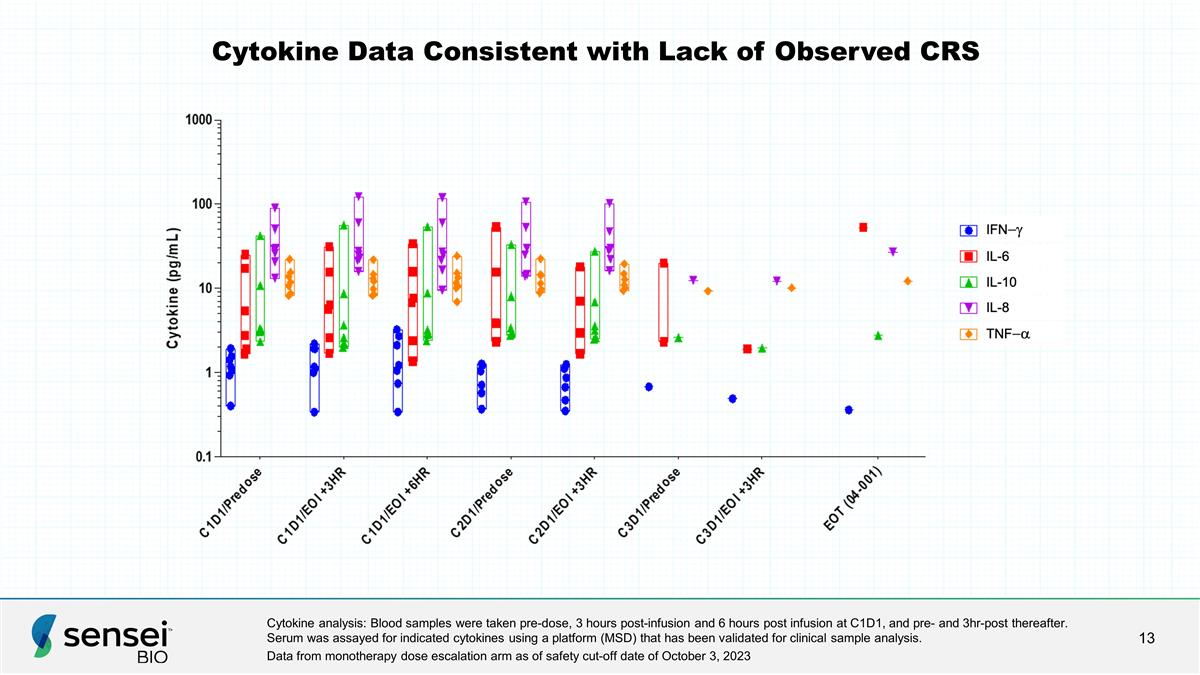
Cytokine Data Consistent with Lack
of Observed CRS Cytokine analysis: Blood samples were taken pre-dose, 3 hours post-infusion and 6 hours post infusion at C1D1, and pre- and 3hr-post thereafter. Serum was assayed for indicated cytokines using a platform (MSD) that has been validated
for clinical sample analysis. Data from monotherapy dose escalation arm as of safety cut-off date of October 3, 2023

SNS-101 Clinical PK Data Show
Linear Pharmacokinetics and Long Half-Life (Unlike Prior Anti-VISTA mAbs) Supports Every 3 Week Dosing Data from monotherapy dose escalation arm as of safety cut-off date of October 3, 2023
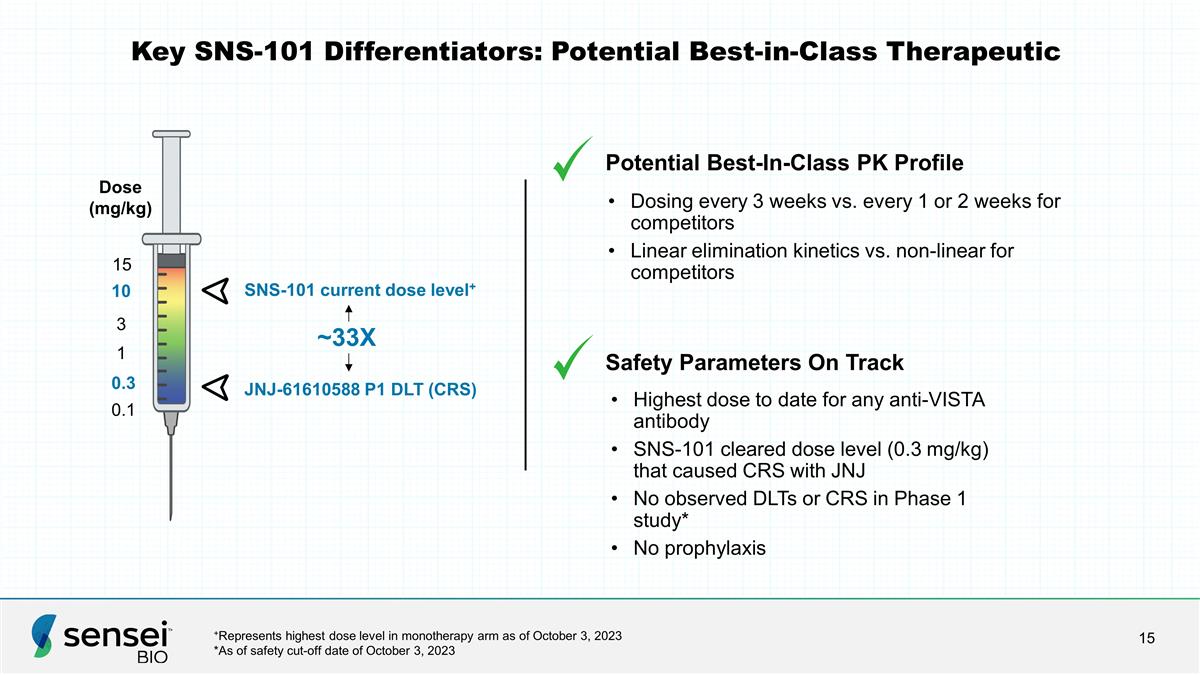
Key SNS-101 Differentiators:
Potential Best-in-Class Therapeutic 0.1 Dose (mg/kg) 0.3 3 10 1 JNJ-61610588 P1 DLT (CRS) SNS-101 current dose level+ ~33X 15 Dosing every 3 weeks vs. every 1 or 2 weeks for competitors Linear elimination kinetics vs. non-linear for competitors
Safety Parameters On Track Highest dose to date for any anti-VISTA antibody SNS-101 cleared dose level (0.3 mg/kg) that caused CRS with JNJ No observed DLTs or CRS in Phase 1 study* No prophylaxis Potential Best-In-Class PK Profile +Represents
highest dose level in monotherapy arm as of October 3, 2023 *As of safety cut-off date of October 3, 2023
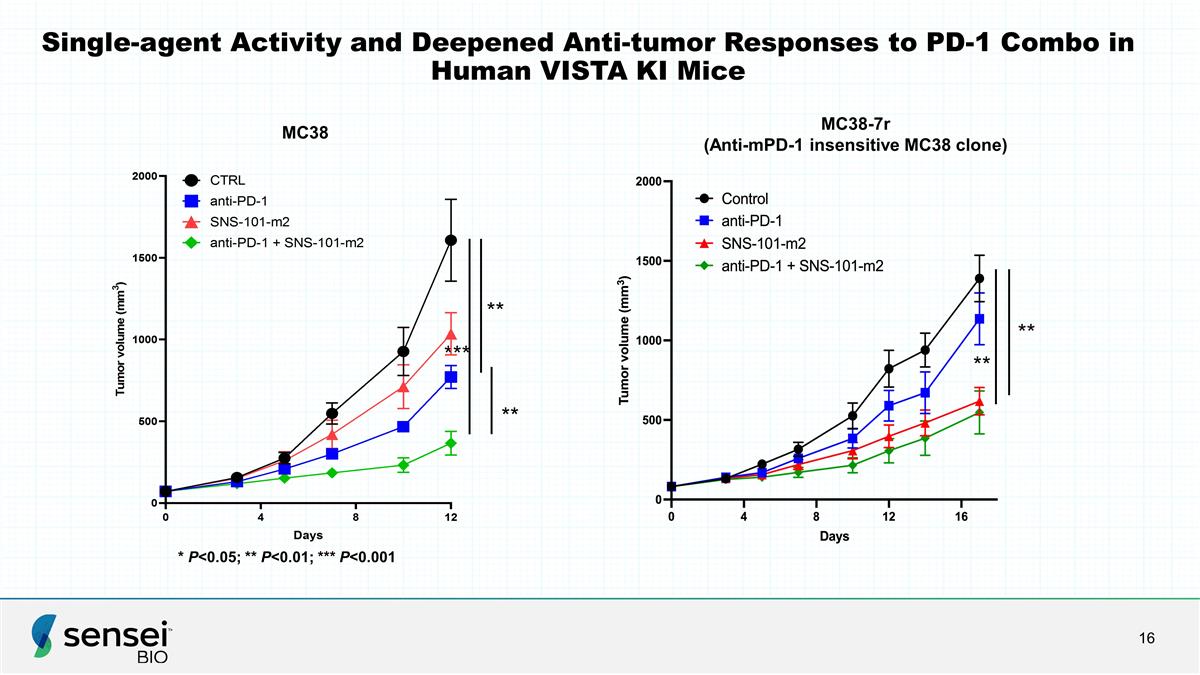
Single-agent Activity and Deepened
Anti-tumor Responses to PD-1 Combo in Human VISTA KI Mice ** ** MC38-7r (Anti-mPD-1 insensitive MC38 clone) *** ** ** * P<0.05; ** P<0.01; *** P<0.001 MC38

SNS-101 Increased CD8 T-cells in
Combination With Anti-PD-1 in MC38 Tumors In Vivo CTRL Anti-PD-1 1mg/kg 5mg/kg Anti-PD-1/SNS-101 3mg/kg 10mg/kg 30mg/kg Frequency of Live, CD45+ Population One-way ANOVA, Tukey Post-Hoc Analysis, * p<0.05; ** p<0.01, *** p<0.001, ****
p<0.0001 with Anti-PD-1 with Anti-PD-1

SNS-101 Completed and Anticipated
Clinical Milestones May 2023: First patient dosed Sept 2023: First patient dosed in combination with Libtayo® Q4 2023: Initial monotherapy PK and safety data Q1 2024: Initial combination PK and safety data Q2 2024: Topline
Phase 1 monotherapy data 2024: Topline combination data

VSIG-4
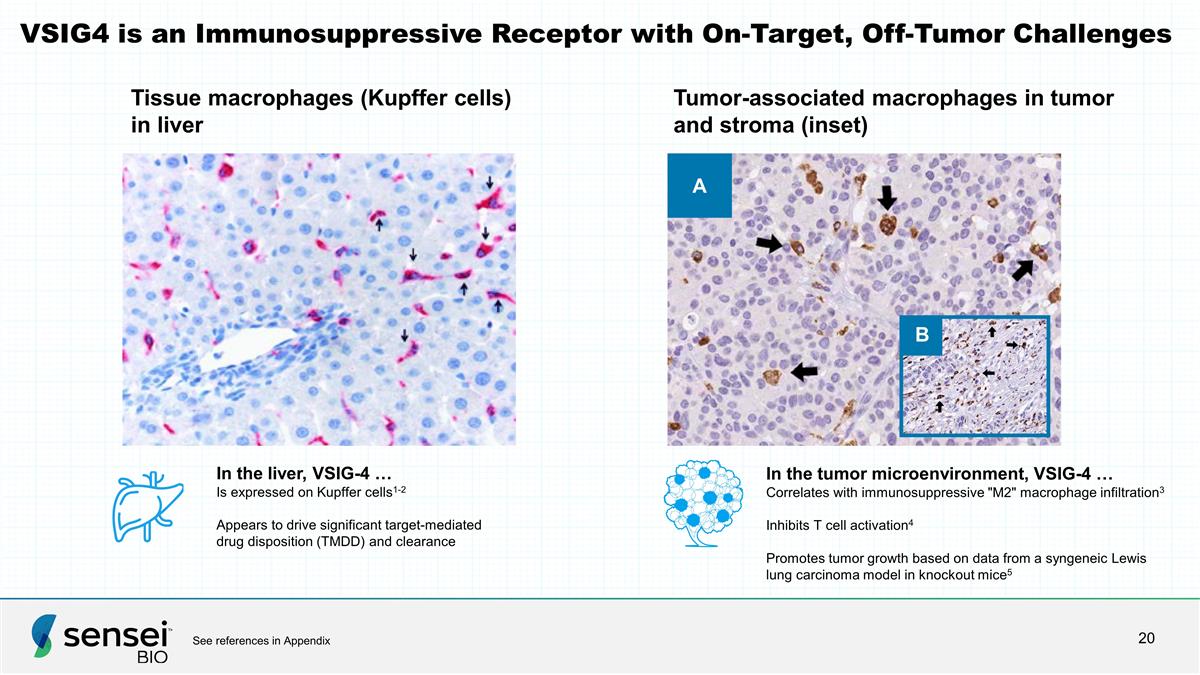
VSIG4 is an Immunosuppressive
Receptor with On-Target, Off-Tumor Challenges See references in Appendix A B Tissue macrophages (Kupffer cells) in liver Tumor-associated macrophages in tumor and stroma (inset) In the liver, VSIG-4 … Is expressed on Kupffer cells1-2
Appears to drive significant target-mediated drug disposition (TMDD) and clearance In the tumor microenvironment, VSIG-4 … Correlates with immunosuppressive "M2" macrophage infiltration3 Inhibits T cell activation4 Promotes tumor growth based
on data from a syngeneic Lewis lung carcinoma model in knockout mice5

SNS-102 is a Highly pH-sensitive
Antibody that Could Reverse T-cell Suppression within the Tumor Microenvironment SNS-102 blocks the interaction of VSIG4 with its novel counter-receptor, which has been provisionally identified pH-Sensitive VSIG4 Parental Antibodies Selected for
Further Optimization Antibody Reference # Ratio of pH Selectivity (6.0 vs 7.4) Blockage of Immobilized VSIG4- T-cell Inhibition Blockage of Cellular VSIG4- T-cell Inhibition 1 1 + + 2 7 + + 3 1 + + 4 3 + + 5 3 +/- + 6 25 + + 7 1 + + 8 2 - + Plan to
select product candidate in 2023

ENTPDase1 (CD39)
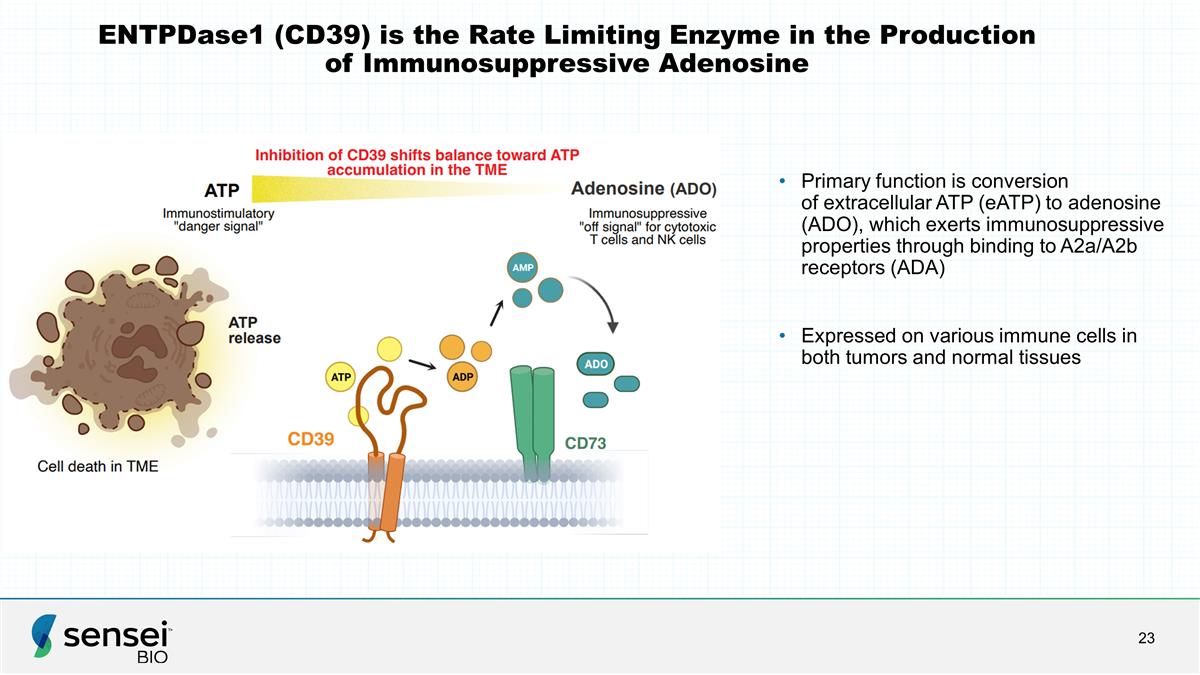
ENTPDase1 (CD39) is the Rate
Limiting Enzyme in the Production of Immunosuppressive Adenosine Primary function is conversion of extracellular ATP (eATP) to adenosine (ADO), which exerts immunosuppressive properties through binding to A2a/A2b receptors (ADA)
Expressed on various immune cells in both tumors and normal tissues
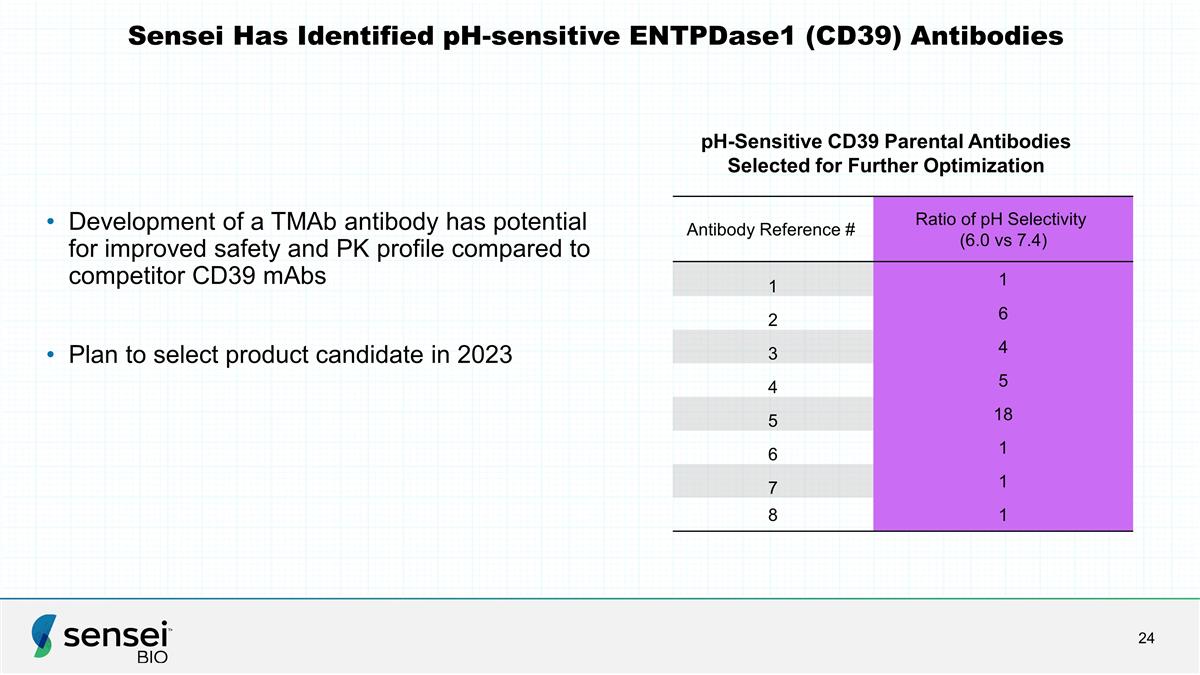
Sensei Has Identified pH-sensitive
ENTPDase1 (CD39) Antibodies Antibody Reference # Ratio of pH Selectivity (6.0 vs 7.4) 1 1 2 6 3 4 4 5 5 18 6 1 7 1 8 1 pH-Sensitive CD39 Parental Antibodies Selected for Further Optimization Development of a TMAb antibody has potential
for improved safety and PK profile compared to competitor CD39 mAbs Plan to select product candidate in 2023
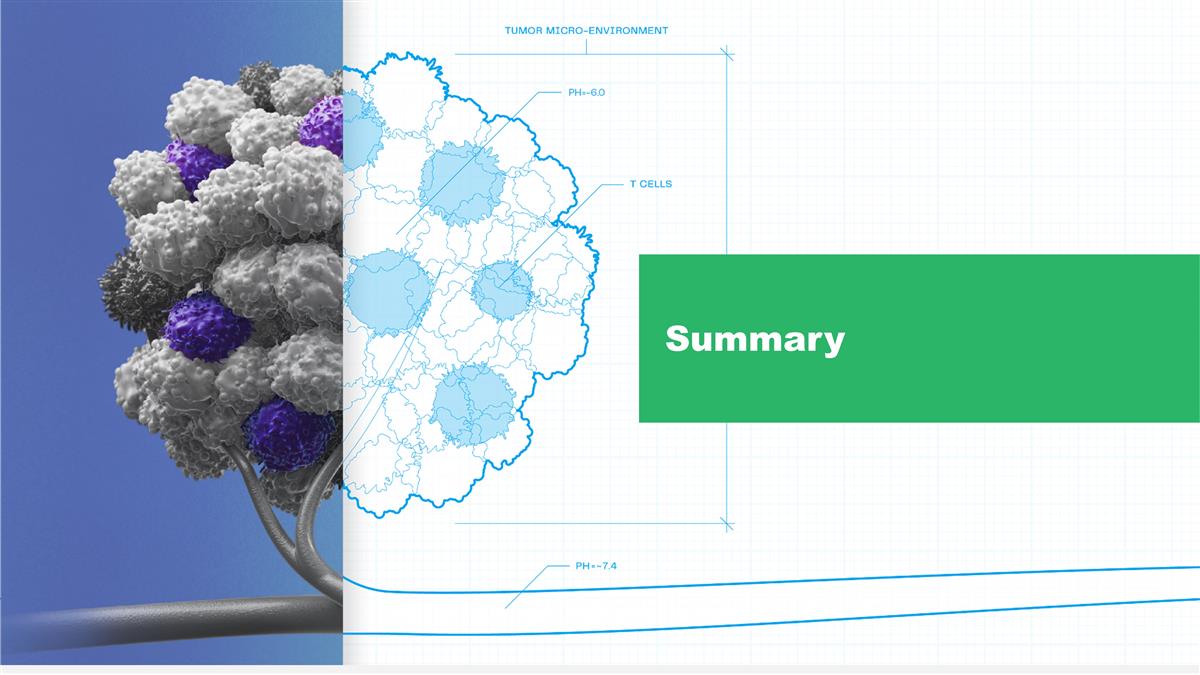
Summary
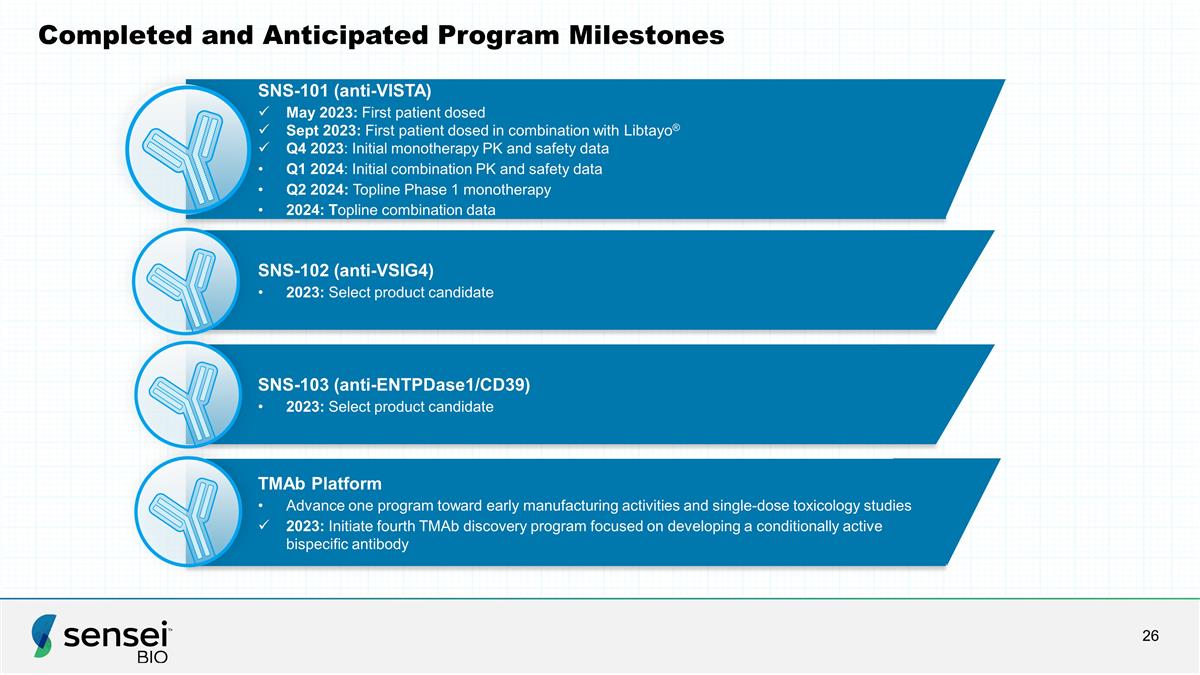
SNS-101 (anti-VISTA) May 2023:
First patient dosed Sept 2023: First patient dosed in combination with Libtayo® Q4 2023: Initial monotherapy PK and safety data Q1 2024: Initial combination PK and safety data Q2 2024: Topline Phase 1 monotherapy 2024:
Topline combination data SNS-102 (anti-VSIG4) 2023: Select product candidate SNS-103 (anti-ENTPDase1/CD39) 2023: Select product candidate Completed and Anticipated Program Milestones TMAb Platform Advance one program toward early manufacturing
activities and single-dose toxicology studies 2023: Initiate fourth TMAb discovery program focused on developing a conditionally active bispecific antibody
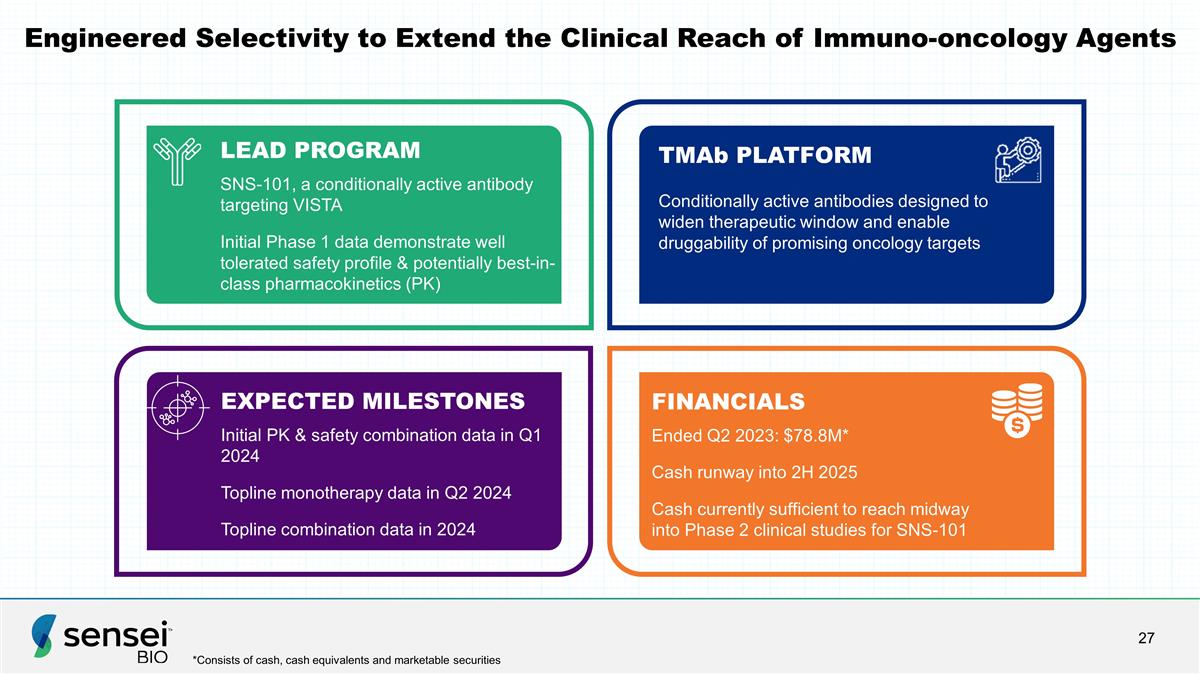
*Consists of cash, cash equivalents
and marketable securities LEAD PROGRAM SNS-101, a conditionally active antibody targeting VISTA Initial Phase 1 data demonstrate well tolerated safety profile & potentially best-in-class pharmacokinetics (PK) TMAb PLATFORM Conditionally active
antibodies designed to widen therapeutic window and enable druggability of promising oncology targets EXPECTED MILESTONES Initial PK & safety combination data in Q1 2024 Topline monotherapy data in Q2 2024 Topline combination data in 2024
FINANCIALS Ended Q2 2023: $78.8M* Cash runway into 2H 2025 Cash currently sufficient to reach midway into Phase 2 clinical studies for SNS-101 Engineered Selectivity to Extend the Clinical Reach of Immuno-oncology Agents

Seasoned Leadership Team John
Celebi, MBA President and CEO Erin Colgan Chief Financial Officer Edward van der Horst, Ph.D. Chief Scientific Officer Stephanie Krebs, M.S., MBA Chief Business Officer Christopher Gerry, J.D. VP, General Counsel

HQ: 1405 Research Blvd, Suite 125,
Rockville, MD 20850 / MA: 22 Boston Wharf Rd, 7th floor, Boston, MA 02210 senseibio.com

Appendix References for Slide 20
Helmy KY, Katschke KJ Jr, Gorgani NN, Kljavin NM, Elliott JM, Diehl L, Scales SJ, Ghilardi N, van Lookeren Campagne M. CRIg: a macrophage complement receptor required for phagocytosis of circulating pathogens. Cell. 2006 Mar 10;124(5):915-27. doi:
10.1016/j.cell.2005.12.039. PMID: 16530040. Voillet V, Berger TR, McKenna KM, Paulson KG, Tan WH, Smythe KS, Hunter DS, Valente WJ, Weaver S, Campbell JS, Kim TS, Byrd DR, Bielas JH, Pierce RH, Chapuis AG, Gottardo R, Rongvaux A. An In Vivo Model of
Human Macrophages in Metastatic Melanoma. J Immunol. 2022 Aug 1;209(3):606-620. doi: 10.4049/jimmunol.2101109. Epub 2022 Jul 11. PMID: 35817516; PMCID: PMC9377377. Reviewed in Small AG, Al-Baghdadi M, Quach A, Hii C, Ferrante A. Complement receptor
immunoglobulin: a control point in infection and immunity, inflammation and cancer. Swiss Med Wkly. 2016 Apr 5;146:w14301. doi: 10.4414/smw.2016.14301. PMID: 27045607. Vogt L, Schmitz N, Kurrer MO, Bauer M, Hinton HI, Behnke S, Gatto D, Sebbel P,
Beerli RR, Sonderegger I, Kopf M, Saudan P, Bachmann MF. VSIG4, a B7 family-related protein, is a negative regulator of T cell activation. J Clin Invest. 2006 Oct;116(10):2817-26. doi: 10.1172/JCI25673. PMID: 17016562; PMCID: PMC1578631. Liao Y, Guo
S, Chen Y, Cao D, Xu H, Yang C, Fei L, Ni B, Ruan Z. VSIG4 expression on macrophages facilitates lung cancer development. Lab Invest. 2014 Jul;94(7):706-15. doi: 10.1038/labinvest.2014.73. Epub 2014 May 26. PMID: 24862966.

The Modern-Day Challenge in
Immuno-Oncology The PD-1/PD-L1 market is big and growing fast1 PD-1/PD-L1 monotherapy does not benefit 70% of patients2 2020 2026 Survival Benefit 20-30% No Survival Benefit 70% 1. Gerber et al., Biochemical Pharmacology 2016 2. Market estimates
from PD-1 and PDL-1 Inhibitors Market Size in 2021 – MarketWatch, 360 Research

Partner / Collaborator Goal
Description Clinical Supply Agreement Support evaluation of SNS-101 in combination with Libtayo® (cemiplimab) in planned Phase 1/2 clinical trial Sensei to fund planned clinical trial Regeneron to provide Libtayo® Sensei maintains global
development and commercial rights to SNS-101 Cooperative Research & Development Agreement Further elucidate role of VISTA in immune checkpoint resistance and expand potential of SNS-101 as a combination therapy beyond anti-PD-1 Sensei
collaborating with NCI Center for Immuno-Oncology Co-Directors, Jeffrey Schlom, Ph.D., and James Gulley, M.D., Ph.D. Preclinical studies will assess SNS-101 mechanism of action in combination with therapies beyond anti-PD-1 Research Collaboration
Further study the mechanism of SNS-101's anti-tumor activity Sensei collaborating with laboratory of immuno-oncology KOL, Robert Schreiber, Ph.D. Preclinical studies will include identification of SNS-101 response biomarkers Key
Partnerships Supporting SNS-101’s Clinical Development Potential opportunities for combination therapy and biomarker identification

PK Sink Continues to be an Issue
with Non-pH-Sensitive VISTA programs* SNS-101 is designed to overcome elimination kinetics and half-life related to PK sink observed in non-pH-sensitive VISTA programs Curis CI-8993 Plasma Concentration Kineta KVA12123 Cyno PK Abcine PMC-309 Serum
Conc Cyno Hummingbird HMBD-002 Preclinical PK Linear Non-linear 1. Hummingbird SITC 2022; 2. Kineta Corporate Presentation; 3. Abcine, SITC 2022; 4. Curis, SITC 2022 *Each graph differs by time course based on data presented Clinical mAb #1 10 mg/kg

SNS-101 Re-sensitized Anti-PD-1
Insensitive Sarcoma Tumors in Human VISTA Knock-in Mice 5/8 CR 1/8 CR * p<0.05
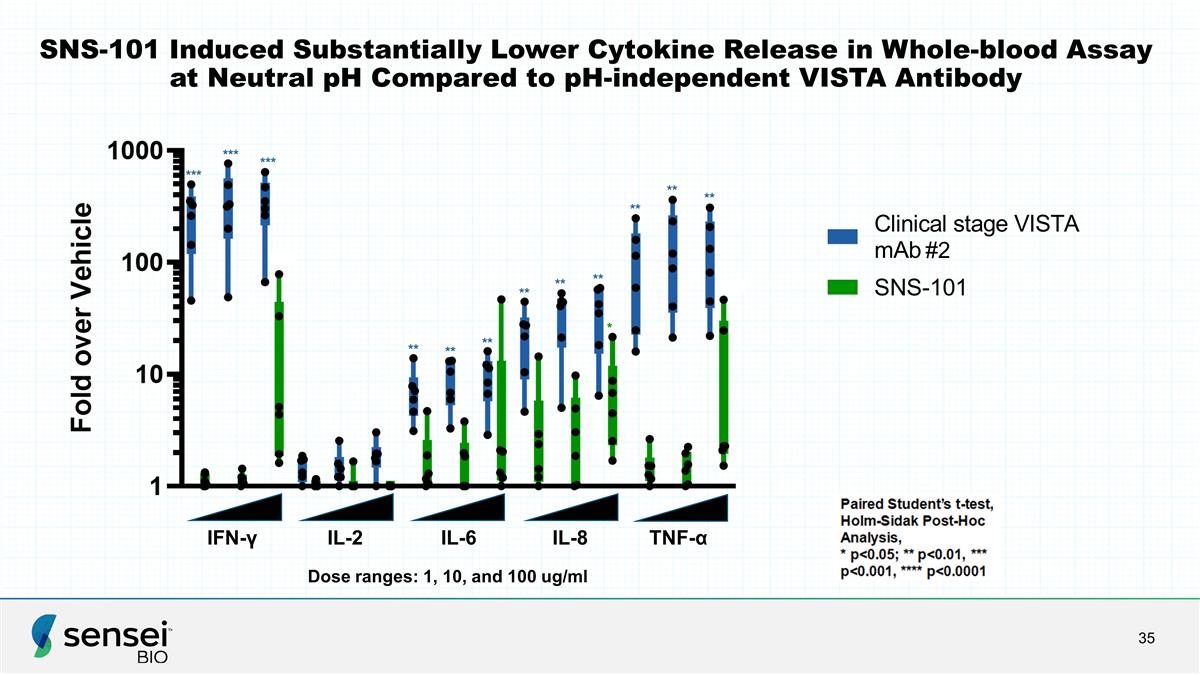
SNS-101 Induced Substantially Lower
Cytokine Release in Whole-blood Assay at Neutral pH Compared to pH-independent VISTA Antibody IFN-γ IL-8 TNF-α IL-6 IL-2 *** *** *** ** * ** ** ** ** ** ** ** ** ** ** Dose ranges: 1, 10, and 100 ug/ml #2
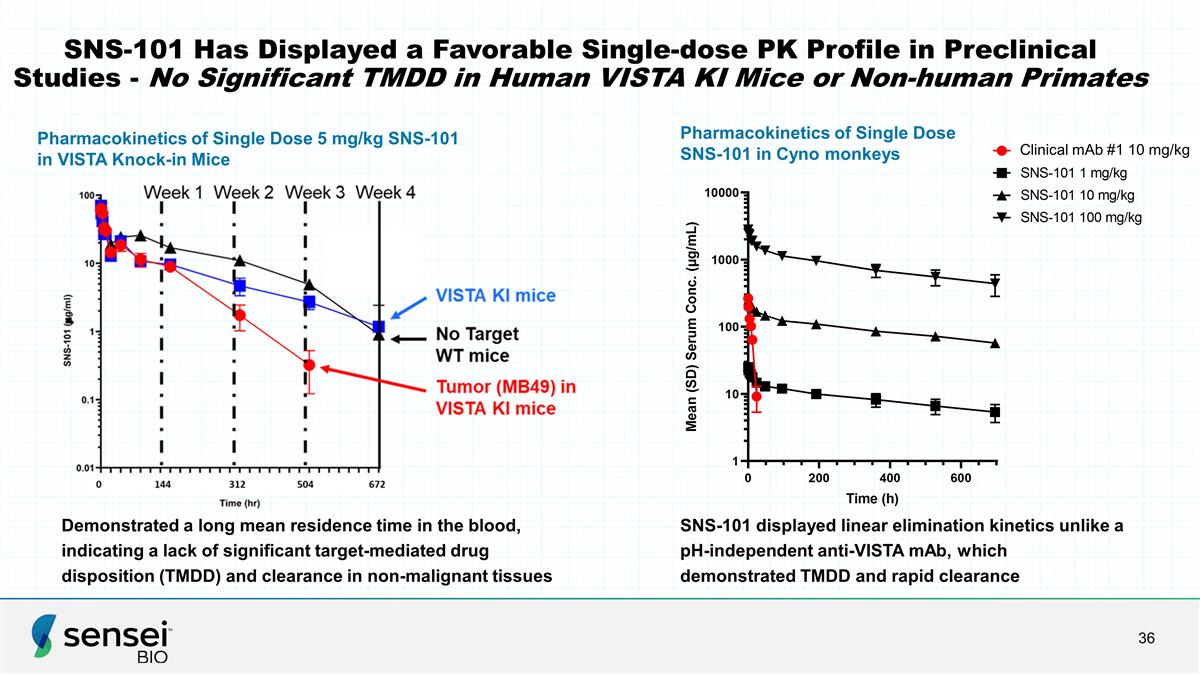
SNS-101 Has Displayed a Favorable
Single-dose PK Profile in Preclinical Studies - No Significant TMDD in Human VISTA KI Mice or Non-human Primates Pharmacokinetics of Single Dose 5 mg/kg SNS-101 in VISTA Knock-in Mice Demonstrated a long mean residence time in the blood, indicating
a lack of significant target-mediated drug disposition (TMDD) and clearance in non-malignant tissues SNS-101 displayed linear elimination kinetics unlike a pH-independent anti-VISTA mAb, which demonstrated TMDD and rapid clearance Pharmacokinetics
of Single Dose SNS-101 in Cyno monkeys Clinical mAb #1 10 mg/kg
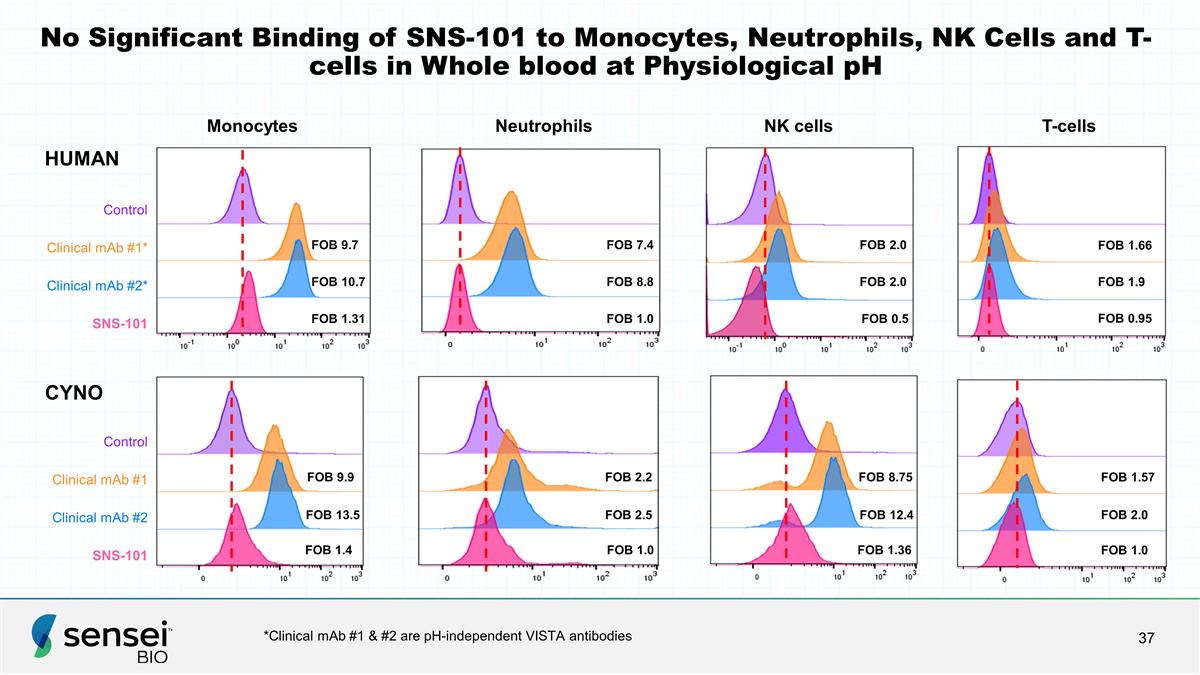
No Significant Binding of SNS-101
to Monocytes, Neutrophils, NK Cells and T-cells in Whole blood at Physiological pH T-cells NK cells FOB 1.57 FOB 2.0 FOB 1.0 FOB 8.75 FOB 12.4 FOB 1.36 Monocytes FOB 9.9 FOB 13.5 FOB 1.4 FOB 2.2 FOB 2.5 FOB 1.0 Neutrophils CYNO HUMAN FOB 7.4 FOB 8.8
FOB 1.0 Clinical mAb #1* Clinical mAb #2* SNS-101 Control FOB 2.0 FOB 2.0 FOB 0.5 Clinical mAb #1 Clinical mAb #2 SNS-101 Control FOB 1.66 FOB 1.9 FOB 0.95 FOB 9.7 FOB 10.7 FOB 1.31 *Clinical mAb #1 & #2 are pH-independent VISTA
antibodies

KVA12123 (Kineta) SNS-101 Is a
Fully Differentiated Anti-VISTA Antibody Phase 1 Phase 1 Phase 1 Phase 1 Phase 1 Preclinical Phase 1 (IgG1) (IgG1) (IgG1) (IgG4) (IgG1) Johnston et al., Nature 2019; Kineta website; Snyder et al, AACR Annual Meeting 2016; Pierre Fabre website;
Hummingbird website; Thakkar et al, J of Immunother Cancer, 2022; PharmAbcine website

Commercially Validated Precedent
for pH-sensitive Approach Soliris (Eculizumab) KD pH 7.4 (nM) 0.03 KD pH 6.0 (nM) 0.6 t½ (d) 3.9 Ultomiris (Ravulizumab, ALXN1210) 0.49 22 13.4 Due to its longer half-life (13.4 d vs 3.9 d), ravulizumab given every 8 weeks achieved
noninferiority compared with eculizumab given every 2 weeks for all efficacy endpoints, while maintaining a similar safety profile. 2018: FDA approves Ultomiris® (ravulizumab, ALXN1210) 2020: Ultomiris sales = $1.08 billion Revulizumab
utilized histidine insertions into the CDR regions (VH_Y27H, VH_S57H) and Fc substitutions (M428L, N434S) of eculizumab Soliris® (eculizumab), an anti-C5 monoclonal antibody (mAb), was considered standard of care for patients with paroxysmal
nocturnal hemoglobinuria (PNH) and atypical hemolytic uremic syndrome, but had a short half-life as a result of extensive TMDD. Engineering eculizumab using histidine substitutions resulted in a pH-sensitive mAb with markedly improved half-life.
Sheridan et al, PLOS One, April 2018 (https://doi.org/10.1371/journal.pone.0195909) Lee et al, Blood, (doi:10.1182/blood-2018-09-876136) Sales figures:
https://media.alexion.com/news-releases/news-release-details/alexion-reports-fourth-quarter-and-full-year-2020-results Antibody Engineering of Solaris Led to pH Sensitivity and Half-Life Improvements

Targeting VISTA and PD-1
Checkpoints in the TME Promotes Anti-tumoral M1 Macrophage Polarization M1 macrophages are anti-tumorigenic through secretion of pro-inflammatory cytokines and chemokines, and driving of Th1 CD4+ T cell responses M2 macrophages are
immunosuppressive; pro-tumor TAMs are a subset of M2-type cells SNS-101 targets suppressive signaling in the myeloid compartment, and in combination with anti-PD-1 may help shift the balance of macrophage polarization toward an anti-tumor M1
phenotype
v3.23.3
| X |
- DefinitionBoolean flag that is true when the XBRL content amends previously-filed or accepted submission.
| Name: |
dei_AmendmentFlag |
| Namespace Prefix: |
dei_ |
| Data Type: |
xbrli:booleanItemType |
| Balance Type: |
na |
| Period Type: |
duration |
|
| X |
- DefinitionFor the EDGAR submission types of Form 8-K: the date of the report, the date of the earliest event reported; for the EDGAR submission types of Form N-1A: the filing date; for all other submission types: the end of the reporting or transition period. The format of the date is YYYY-MM-DD.
| Name: |
dei_DocumentPeriodEndDate |
| Namespace Prefix: |
dei_ |
| Data Type: |
xbrli:dateItemType |
| Balance Type: |
na |
| Period Type: |
duration |
|
| X |
- DefinitionThe type of document being provided (such as 10-K, 10-Q, 485BPOS, etc). The document type is limited to the same value as the supporting SEC submission type, or the word 'Other'.
| Name: |
dei_DocumentType |
| Namespace Prefix: |
dei_ |
| Data Type: |
dei:submissionTypeItemType |
| Balance Type: |
na |
| Period Type: |
duration |
|
| X |
- DefinitionAddress Line 1 such as Attn, Building Name, Street Name
| Name: |
dei_EntityAddressAddressLine1 |
| Namespace Prefix: |
dei_ |
| Data Type: |
xbrli:normalizedStringItemType |
| Balance Type: |
na |
| Period Type: |
duration |
|
| X |
- DefinitionAddress Line 2 such as Street or Suite number
| Name: |
dei_EntityAddressAddressLine2 |
| Namespace Prefix: |
dei_ |
| Data Type: |
xbrli:normalizedStringItemType |
| Balance Type: |
na |
| Period Type: |
duration |
|
| X |
- Definition
+ References
+ Details
| Name: |
dei_EntityAddressCityOrTown |
| Namespace Prefix: |
dei_ |
| Data Type: |
xbrli:normalizedStringItemType |
| Balance Type: |
na |
| Period Type: |
duration |
|
| X |
- DefinitionCode for the postal or zip code
| Name: |
dei_EntityAddressPostalZipCode |
| Namespace Prefix: |
dei_ |
| Data Type: |
xbrli:normalizedStringItemType |
| Balance Type: |
na |
| Period Type: |
duration |
|
| X |
- DefinitionName of the state or province.
| Name: |
dei_EntityAddressStateOrProvince |
| Namespace Prefix: |
dei_ |
| Data Type: |
dei:stateOrProvinceItemType |
| Balance Type: |
na |
| Period Type: |
duration |
|
| X |
- DefinitionA unique 10-digit SEC-issued value to identify entities that have filed disclosures with the SEC. It is commonly abbreviated as CIK. Reference 1: http://www.xbrl.org/2003/role/presentationRef
-Publisher SEC
-Name Exchange Act
-Number 240
-Section 12
-Subsection b-2
| Name: |
dei_EntityCentralIndexKey |
| Namespace Prefix: |
dei_ |
| Data Type: |
dei:centralIndexKeyItemType |
| Balance Type: |
na |
| Period Type: |
duration |
|
| X |
- DefinitionIndicate if registrant meets the emerging growth company criteria. Reference 1: http://www.xbrl.org/2003/role/presentationRef
-Publisher SEC
-Name Exchange Act
-Number 240
-Section 12
-Subsection b-2
| Name: |
dei_EntityEmergingGrowthCompany |
| Namespace Prefix: |
dei_ |
| Data Type: |
xbrli:booleanItemType |
| Balance Type: |
na |
| Period Type: |
duration |
|
| X |
- DefinitionCommission file number. The field allows up to 17 characters. The prefix may contain 1-3 digits, the sequence number may contain 1-8 digits, the optional suffix may contain 1-4 characters, and the fields are separated with a hyphen.
| Name: |
dei_EntityFileNumber |
| Namespace Prefix: |
dei_ |
| Data Type: |
dei:fileNumberItemType |
| Balance Type: |
na |
| Period Type: |
duration |
|
| X |
- DefinitionTwo-character EDGAR code representing the state or country of incorporation.
| Name: |
dei_EntityIncorporationStateCountryCode |
| Namespace Prefix: |
dei_ |
| Data Type: |
dei:edgarStateCountryItemType |
| Balance Type: |
na |
| Period Type: |
duration |
|
| X |
- DefinitionThe exact name of the entity filing the report as specified in its charter, which is required by forms filed with the SEC. Reference 1: http://www.xbrl.org/2003/role/presentationRef
-Publisher SEC
-Name Exchange Act
-Number 240
-Section 12
-Subsection b-2
| Name: |
dei_EntityRegistrantName |
| Namespace Prefix: |
dei_ |
| Data Type: |
xbrli:normalizedStringItemType |
| Balance Type: |
na |
| Period Type: |
duration |
|
| X |
- DefinitionThe Tax Identification Number (TIN), also known as an Employer Identification Number (EIN), is a unique 9-digit value assigned by the IRS. Reference 1: http://www.xbrl.org/2003/role/presentationRef
-Publisher SEC
-Name Exchange Act
-Number 240
-Section 12
-Subsection b-2
| Name: |
dei_EntityTaxIdentificationNumber |
| Namespace Prefix: |
dei_ |
| Data Type: |
dei:employerIdItemType |
| Balance Type: |
na |
| Period Type: |
duration |
|
| X |
- DefinitionLocal phone number for entity.
| Name: |
dei_LocalPhoneNumber |
| Namespace Prefix: |
dei_ |
| Data Type: |
xbrli:normalizedStringItemType |
| Balance Type: |
na |
| Period Type: |
duration |
|
| X |
- DefinitionBoolean flag that is true when the Form 8-K filing is intended to satisfy the filing obligation of the registrant as pre-commencement communications pursuant to Rule 13e-4(c) under the Exchange Act. Reference 1: http://www.xbrl.org/2003/role/presentationRef
-Publisher SEC
-Name Exchange Act
-Number 240
-Section 13e
-Subsection 4c
| Name: |
dei_PreCommencementIssuerTenderOffer |
| Namespace Prefix: |
dei_ |
| Data Type: |
xbrli:booleanItemType |
| Balance Type: |
na |
| Period Type: |
duration |
|
| X |
- DefinitionBoolean flag that is true when the Form 8-K filing is intended to satisfy the filing obligation of the registrant as pre-commencement communications pursuant to Rule 14d-2(b) under the Exchange Act. Reference 1: http://www.xbrl.org/2003/role/presentationRef
-Publisher SEC
-Name Exchange Act
-Number 240
-Section 14d
-Subsection 2b
| Name: |
dei_PreCommencementTenderOffer |
| Namespace Prefix: |
dei_ |
| Data Type: |
xbrli:booleanItemType |
| Balance Type: |
na |
| Period Type: |
duration |
|
| X |
- DefinitionTitle of a 12(b) registered security. Reference 1: http://www.xbrl.org/2003/role/presentationRef
-Publisher SEC
-Name Exchange Act
-Number 240
-Section 12
-Subsection b
| Name: |
dei_Security12bTitle |
| Namespace Prefix: |
dei_ |
| Data Type: |
dei:securityTitleItemType |
| Balance Type: |
na |
| Period Type: |
duration |
|
| X |
- DefinitionName of the Exchange on which a security is registered. Reference 1: http://www.xbrl.org/2003/role/presentationRef
-Publisher SEC
-Name Exchange Act
-Number 240
-Section 12
-Subsection d1-1
| Name: |
dei_SecurityExchangeName |
| Namespace Prefix: |
dei_ |
| Data Type: |
dei:edgarExchangeCodeItemType |
| Balance Type: |
na |
| Period Type: |
duration |
|
| X |
- DefinitionBoolean flag that is true when the Form 8-K filing is intended to satisfy the filing obligation of the registrant as soliciting material pursuant to Rule 14a-12 under the Exchange Act. Reference 1: http://www.xbrl.org/2003/role/presentationRef
-Publisher SEC
-Name Exchange Act
-Section 14a
-Number 240
-Subsection 12
| Name: |
dei_SolicitingMaterial |
| Namespace Prefix: |
dei_ |
| Data Type: |
xbrli:booleanItemType |
| Balance Type: |
na |
| Period Type: |
duration |
|
| X |
- DefinitionTrading symbol of an instrument as listed on an exchange.
| Name: |
dei_TradingSymbol |
| Namespace Prefix: |
dei_ |
| Data Type: |
dei:tradingSymbolItemType |
| Balance Type: |
na |
| Period Type: |
duration |
|
| X |
- DefinitionBoolean flag that is true when the Form 8-K filing is intended to satisfy the filing obligation of the registrant as written communications pursuant to Rule 425 under the Securities Act. Reference 1: http://www.xbrl.org/2003/role/presentationRef
-Publisher SEC
-Name Securities Act
-Number 230
-Section 425
| Name: |
dei_WrittenCommunications |
| Namespace Prefix: |
dei_ |
| Data Type: |
xbrli:booleanItemType |
| Balance Type: |
na |
| Period Type: |
duration |
|
| X |
- Details
| Name: |
us-gaap_StatementClassOfStockAxis=us-gaap_CommonStockMember |
| Namespace Prefix: |
|
| Data Type: |
na |
| Balance Type: |
|
| Period Type: |
|
|
| X |
- Details
| Name: |
us-gaap_StatementClassOfStockAxis=us-gaap_SeriesAPreferredStockMember |
| Namespace Prefix: |
|
| Data Type: |
na |
| Balance Type: |
|
| Period Type: |
|
|
Sensei Biotherapeutics (NASDAQ:SNSE)
過去 株価チャート
から 12 2024 まで 1 2025

Sensei Biotherapeutics (NASDAQ:SNSE)
過去 株価チャート
から 1 2024 まで 1 2025
